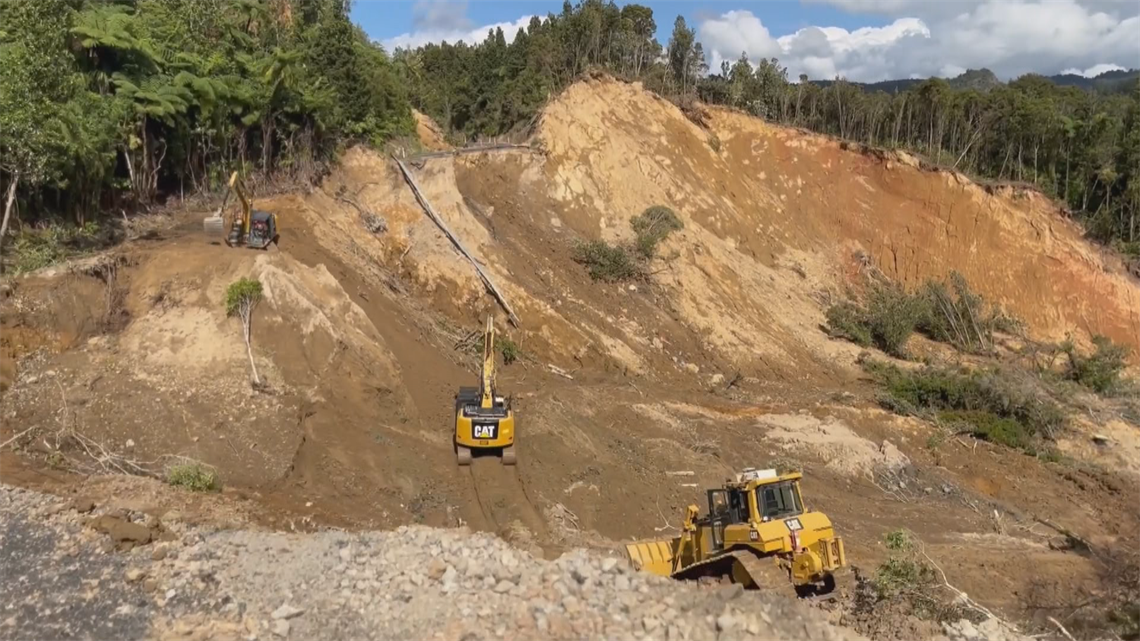Cyclone Recovery Implementation Plan introduced to Council
Published on 17 May 2023

A Recovery Plan for our district is under development, which will now help guide the medium and long-term social, economic, infrastructure and environmental rebuilding of the Coromandel following extreme weather events, including Cyclones Hale and Gabrielle.
Progress on the plan was detailed at yesterday’s Council meeting. The full report is part of the meeting’s agenda.
Since July 2022 the Coromandel has experienced eight significant storm events that required our Civil Defence Emergency Operations Centre to be activated.
Already this year we’ve exceeded our average annual rainfall, with just over 3.5 metres so far.
“We’re still dealing with 110 slip sites, saturated ground conditions and temporary traffic arrangements causing longer travel times for thousands of residents,” says Stephen Town, our Recovery Lead.
“At the same time as we’re working through our recovery, livelihoods, businesses, homes and environments on and around the district will continue to be under threat from further storm events.
The Recovery Plan is expected to be completed by 31 May and will be submitted to the National Emergency Management Agency (NEMA). Other cyclone affected regions around the country are also working on similar recovery plans.
Our Plan has input from stakeholders and agencies we’re working with through our road to recovery, which will be ongoing.
Our Plan focuses on four work streams:
1. Thriving businesses (sustainable)
“Businesses, communities, friends and neighbours have all rallied around, but we still need support and will do for some time to come,” says our Mayor Len Salt.
We’re acutely aware our economy has been severely impacted by the weather and damage to roads.
For more on that, check out the latest data further down from Infometrics, an independent economic analysis firm our Council uses, below.
"We’re thankful local businesses who applied have been supported through government funding, and we’ll continue to lobby government for continued business support until SH25A is reopened, expected early next year,” says Mayor Len.
Immediate assistance that’s been distributed:
- Mayoral Disaster Relief Fund – 203 applicants have received a total of $437,000 so far.
- Business Recovery Grants – 398 applicants have received a total of $3.8 million with a further $4.3 million in the process currently being allocated
The feasibility of a ‘blue highway’ of coastal shipping to more freight is being examined in partnership with Waka Kotahi/NZTA.
2. Fit-for-purpose infrastructure (resilient)
The roading network is still fragile and more slips and damage are likely through the winter. There’s been significant damage to dunes and coastal structures such as beach accessways. Waste and wastewater assets suffered damage as did parks and reserves. Solid waste collections are still impacted in the northern Coromandel due to damaged unsealed roads and restricted turning flexibility for the larger rubbish trucks.
Our Council is partnering with Waka Kotahi/NZTA to make best use of local contractors for works on local and state highways and to develop the workforce within the district so construction workers have career opportunities here.
Where roads need to be repaired, they will be improved so they can better cope with severe weather and be less prone to damage. Road work will be aligned with our Shoreline Management Plan climate change adaptation pathways so that opportunities to build greater resilience into the network is not missed.
The government has confirmed that their financial assistance rate for the cost of emergency road works provided through Waka Kotahi/NZTA will continue to be 91 per cent for the 2023/24 financial year. See this separate report to Council on roading costs.
3. Rural and communities support (connected)
Small and large business, children through to elderly, supply chains, sport, education, health care, support agencies and our Council as an organisation are all impacted to some degree because of the inability to move or travel easily and safely throughout the district.
Three new positions on Council staff (A community partners coordinator and two social navigators) have been created (two of those positions paid with government funding) and are being filled. Our community partnership team will connect with government agencies and local social support providers to make sure all available funding and assistance is put to use and joined up.
We’ve obtained funding for 10 resilience kits containing emergency communications equipment that will be placed in strategic points around the district to help keep isolated communities in touch.
4. Our natural environment (enhanced)
The storms and volume of rainfall have caused wide-spread damage and impact on the Coromandel’s biodiversity, water quality, sustainability, coastal beauty and intrinsic values.
We’re working with stakeholders to reopen assets.
Staff will continue to work closely with our partners on programmes and projects that contribute to environmental restoration through future annual plans and long-term plans.
Latest Economic Data
Provisional estimates from Infometrics, an independent economic analysis firm our Council shows economic growth in the Coromandel was just 0.5 per cent per annum in the quarter to March 2023, compared to the 2.7 per cent increase nationally.
Card spending data from Marketview shows a drop of 11 per cent per annum in the same quarter, which equates to nearly $22 million less spent in the Coromandel compared to the same time last year.
-
Total card spending by tourists in the Coromandel was down 1.4 per cent over 12 months to March 2023, with the weather being the obvious driver. Data suggests that we lost at least a third of our usual domestic tourism spending.
-
The number of locals employed rose just 0.7 per cent, making our district the 12th slowest area for employment growth. Manufacturing, wholesaling and primary industries saw a fall in employment; retail accommodation and food services were higher than a year ago, but those operators would have faced much tougher operating conditions over the first quarter of 2023. Solid growth in the professional, financial and public sector employment underscores stronger underlying economic momentum in the district.
-
Our district’s unemployment rate rose slightly to match the annual national average of 3.4 per cent, after previously being 3.1 per cent.
-
Guest nights showed an increase of 13.2 per cent for our district, although this was substantially lower than the national annual average of 52 per cent.
-
House sales dropped by 34 per cent compared to a year ago, lower than both the Waikato region (-9.9 per cent) and national (-11.4 per cent) decrease.
-
Residential consents dropped by 19.6 per cent, compared to the -7.9 per cent seen nationally.
For more economic data on the Coromandel, visit our website.
Destination Hauraki-Coromandel raising the profile of the Coromandel
 Destination Hauraki Coromandel (DHC) attended TRENZ last week where they had 48 appointments with carefully-selected agents from around the world.
Destination Hauraki Coromandel (DHC) attended TRENZ last week where they had 48 appointments with carefully-selected agents from around the world.
TRENZ is the most significant international business-to-business travel trade event on New Zealand’s tourism events calendar.
Highlights included the returning optimism from key markets such as UK/Europe and US markets. NZ remains a bucket list destination and travellers deferred trips, rather than cancelled trips, during COVID. DHC observed a high rate of rebooking with shorter booking windows. There was genuine interest in more out of the way experiences, especially guided experiences (to connect with local stories) and length of stay extending.
More requests for higher-end accommodation show that the style of travel has changed. Trade shared that visitors are willing to pay more for a transformative experience.
It was a great opportunity to network with industry peers for the DHC team and also Coromandel Town’s Driving Creek Railway, with CEO Jesse Oppat also in attendance.
DHC General Manager Hadley Dryden also attended and used this opportunity to connect with the Tourism Minister Peeni Henare, Tourism New Zealand CEO Rene DeMonchy, Tourism Industry Association CEO Rebecca Ingram and TIA Sustainability advocates and otherst to highlight the issues our district is facing with the huge decrease in visitor numbers - and what support the Coromandel can receive from the Tourism Ministry.